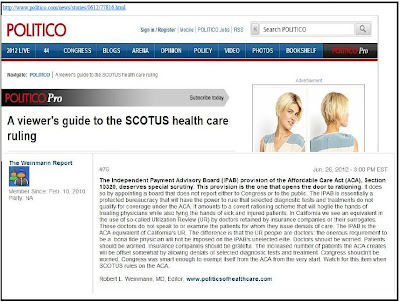Transcript of above:
#76
Jun. 26, 2012 - 3:00 PM EST
The Independent Payment Advisory Board (IPAB) provision of the Affordable Care Act (ACA), Section 10320, deserves special scrutiny. This provision is the one that opens the door to rationing. It does so by appointing a board that does not report either to Congress or to the public. The IPAB is essentially a protected bureaucracy that will have the power to rule that selected diagnostic tests and treatments do not qualify for coverage under the ACA. It amounts to a covert rationing scheme that will hogtie the hands of treating physicians while also tying the hands of sick and injured patients. In California we see an equivalent in the use of so-called Utilization Review (UR) by doctors retained by insurance companies or their surrogates. These doctors do not speak to or examine the patients for whom they issue denials of care. The IPAB is the ACA equivalent of California's UR. The difference is that the UR people are doctors: the onerous requirement to be a bona fide physician will not be imposed on the IPAB's unelected elite. Doctors should be worried. Patients should be worried. Insurance companies should be grateful. The increased number of patients the ACA creates will be offset somewhat by allowing denials of selected diagnostic tests and treatment. Congress shouldn't be worried. Congress was smart enough to exempt itself from the ACA from the very start. Watch for this item when SCOTUS rules on the ACA.
Robert L. Weinmann, MD, Editor, http://www.politicsofhealthcare.com/
The point is we're being distracted with dissertations on The Commerce Clause, issues of penalty versus taxation, even some psychoanalysis of Chief Justice Roberts, everything but how access to health care is being reconstructed and even restricted. Here are some of the issues:
1) ACA makes no restriction on how high insurance premiums can be raised,
2) The IPAB provision derived from Section 10320 of the ACA allows entire treatment protocols to be disqualified from coverage to maximize cost savings. Physicians and their patients will need to fight if they want to have anything significant to say about this process.
3) Doctors will be advised to see more patients faster to make up in volume for reduced remuneration to accommodate the huge anticipated increases in eligible recipients. Physicians will have to learn to stand their ground when it comes to deciding length of hospital stays and time allotted to patients.
4) Patients who can afford it may use the coverage that's allowed under ACA and step outside the system for whatever ACA doesn't cover,
5) The IPAB will become the Controller of health care because it will make the rules and regulations that decide what qualifies as allowable care under the ACA. The IPAB is a federalized version of California's Utilization Review in Workers' Compensation. Decision-making authority will be in the hands of unelected politicians appointed to the IPAB by other politicians. As the Romans used to say, Cave Canem (Beware of the Dog).
Robert L. Weinmann, MD, Editor, http://www.politicsofhealthcare.com/
The point is we're being distracted with dissertations on The Commerce Clause, issues of penalty versus taxation, even some psychoanalysis of Chief Justice Roberts, everything but how access to health care is being reconstructed and even restricted. Here are some of the issues:
1) ACA makes no restriction on how high insurance premiums can be raised,
2) The IPAB provision derived from Section 10320 of the ACA allows entire treatment protocols to be disqualified from coverage to maximize cost savings. Physicians and their patients will need to fight if they want to have anything significant to say about this process.
3) Doctors will be advised to see more patients faster to make up in volume for reduced remuneration to accommodate the huge anticipated increases in eligible recipients. Physicians will have to learn to stand their ground when it comes to deciding length of hospital stays and time allotted to patients.
4) Patients who can afford it may use the coverage that's allowed under ACA and step outside the system for whatever ACA doesn't cover,
5) The IPAB will become the Controller of health care because it will make the rules and regulations that decide what qualifies as allowable care under the ACA. The IPAB is a federalized version of California's Utilization Review in Workers' Compensation. Decision-making authority will be in the hands of unelected politicians appointed to the IPAB by other politicians. As the Romans used to say, Cave Canem (Beware of the Dog).



